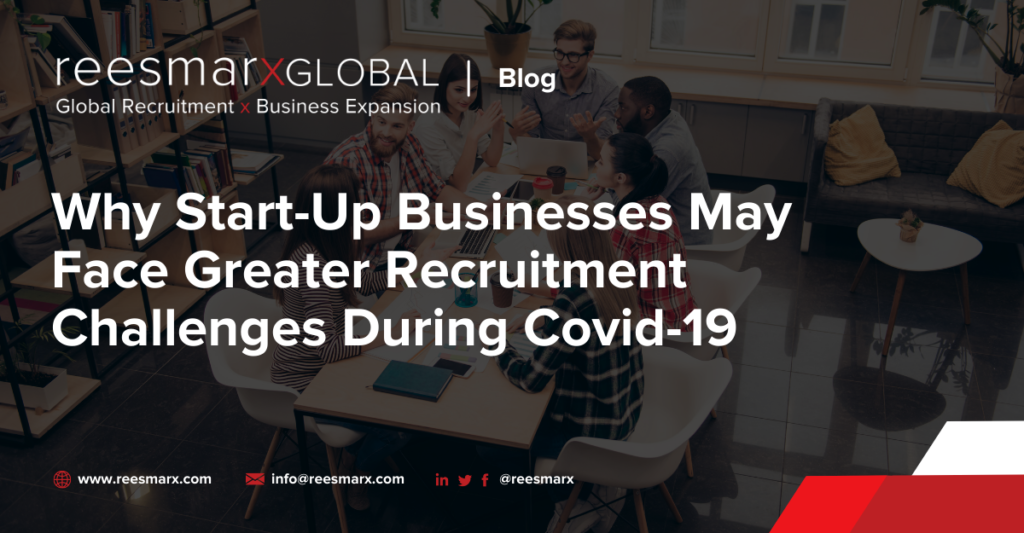After almost a decade of a candidate’s recruitment market, the pandemic has caused substantial economic contraction and job loss. In virtually every country, there have been record-setting levels of unemployment. The pendulum for employers has shifted; it is now an employer’s market once more.
Not all industries have been impacted the same way. In some sectors, like digital marketing and advertising, manufacturing, and distribution of healthcare products and home technology, the business has never been better. Some companies have experienced unexpected exponential growth, rather than contraction during the era of Covid-19.
Businesses in a position to grow, are finding that the pandemic has provided another unexpected benefit, increased availability of talent. However, start-up businesses are facing an increased challenge to recruit (and retain) vital human capital. And that can stifle growth prospects for new enterprises.
The Good News for Start-Up Companies: The Talent Drought is Temporarily Over
Not that long ago, small, and medium-sized businesses and start-up ventures experienced challenges competing for skilled employees. A large percentage of candidates prefer to work for established corporations or multinationals. The inaccurate perceptions of corporate jobs as lucrative with more advancement opportunities persist. Large companies attract top talent because of those perceptions.
Availability has also been a problem in high-demand regions. For instance, you would think that recruiting and hiring an I.T. professional in Southern California (Silicon Valley) would be easy. The region attracts top tech talent. However, some companies experienced so much difficulty recruiting tech talent, that they moved headquarters to start tech hubs in non-traditional areas of the United States. Like Boston Massachusetts, or Austin Texas.
That talent drought may be over (for now) as the world faces the economic shockwaves of the first global pandemic since 1918. Skilled professionals are unemployed and looking for a new career opportunity. And that presents a competitive advantage for businesses in a position to recruit and hire new staff.
The Bad News for Start-Up Organizations: Employees May Feel Start-Up’s Are High Risk
When the global economy is thriving, skilled professionals feel more confident about joining a start-up. There is always a degree of risk associated with new venture. Will the company be well-funded? Will it launch in a successful way and rapidly enter the market and build momentum that will provide the capital to continue growth?
In a conventional economic climate, talented business professionals may feel that the risk is worth the reward. And if the opportunity with a start-up organization does not “work out” they can pivot and find a new employer (if required). That may not be true right now, during the pandemic and the uncertain employment climate.
Labor market research on the impact of Covid-19 on global unemployment rates paints an accurate picture of job loss in developed countries. In a recent report from Brookings, the estimated job loss was 38 million unemployed, who had filed for unemployment insurance during the pandemic. Out of 660 million workers, 5.7% of the labor pool had filed for unemployment benefits.
The number of unemployed workers in countries like Canada, Israel, Ireland, and the United States is higher compared to the global average. The United States appeared to peak in June of 2020, with 13% of workers receiving unemployment benefits. By July however, the United States Bureau of Labor and Statistics had reported that the number of unemployed had fallen to approximately 10%. The average unemployment rate for the previous ten years in the United States was 3.5%.
Candidate confidence in regional and in the global job market is currently pessimistic. Some professionals have experienced reduced pay. Others have had salaries and bonuses significantly reduced and accepted those terms as a means to stay employed. Rather than risk searching for a new role in an uncertain labor climate. Many employees have been ‘laid off’ and dismissal rates are high as businesses attempt to cut costs.
Best Practice Recommendations for Start-Up Businesses Recruiting in 2020
Micro-businesses and start-ups thrive during global economic downturns. If they can source the talent, they need to weather current economic adversities. Here are some ideas to consider as you refine your hiring strategy for the duration of 2020 and in 2021.
- Offer remote work or telecommuting opportunities. If the role can be fulfilled at home (instead of in-office) the accommodation is greatly appreciated by prospective hires. Many professionals weigh the ability to work from home as an enticing incentive. Leverage that in your hiring strategy.
- Diversify your hires looking for skillsets that may now be required. The current health crisis has changed previous roles and responsibilities, and new positions and skills may be needed for post-pandemic recovery. Hire strategically for business needs now, and in the immediate future.
- Seek out candidates that have successfully demonstrated the ability to work productively from home. We cannot predict how long the pandemic will last, and your business may need to migrate to 100% remote work if infection rates become an even greater concern.
- Consider perks and benefits through EAPs (employee assistant programs) as a way to meet the safety, lifestyle, and personal needs of new hires. Additional vacation time subsidized continuing education and other benefits can help you recruit top talent.
One of the most important things that start-up (and any business) can do during the pandemic, is to share the growth and maintenance strategy of the organization. Knowing that your business has throughout contingency plans in place to survive and then thrive post-pandemic can provide confidence and assurance to prospective candidates.
For more insights and tips, watch our recent Globinar replay “Successful Hiring Through the Covid-19 Pandemic” with Global Chamber®.






